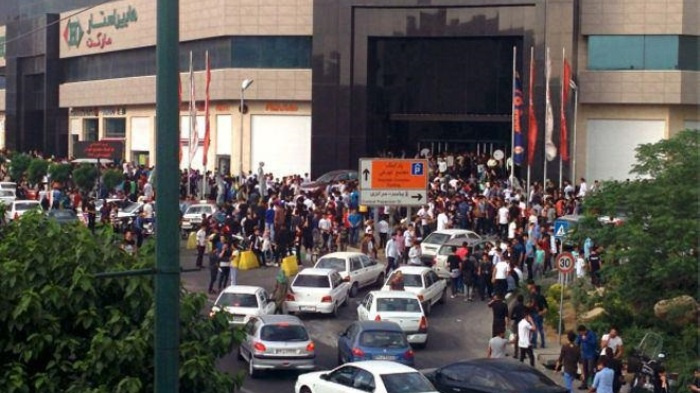Meeting Generation Z: Rare gathering in Tehran catches observers by surprise

(Picture: teenagers' gathering in Koroush Complex)
In mid-November 2014, Tehran witnessed one of the most attended funerals of its history. The departed, Morteza Pashaei, was neither a reputed cleric nor a war hero, but a lesser known singer and a victim of cancer. The funeral led to a frenzy of analysis among the 'elite' observers, most of which were based not on field analysis or familiarity with Pashaei's music, but in the feeling of being caught off guard with an unknown phenomenon that was outside the elite taste, hence imbued with a healthy dose of contempt towards Pashaei and the mourners.
The gathering that took place on last Tuesday in Koroush Mall, a posh shopping and cultural complex in western Tehran, while quite minor in comparison to Pashaei's funeral, has sparked off a similar sense of puzzlement in a smaller scale.
In western Tehran, a developing region with a high number of immigrants and a less conservative culture, teenagers picked the mall for a rendezvous to celebrate the end of school exams and start of the summer holiday. Nearly 2000 youngsters showed up for the "meeting", as its unknown organizers called it, on Tuesday evening, only to be dispersed by the police, and after the mall was ordered to be shut down for several hours.
Footage released from the get-together shows freestyle dancing and fighting of the teenagers outside the shopping mall, apparently after they were forced by the complex security guards to leave the complex.
Mohammad-Reza Rostami, Deputy Minister of Youth Affairs and Sports, endorsed such events in his interview with the Reformist daily Shargh, expressing sorrow for lack of appropriate venues that could host teenagers for such gatherings. "Confrontation and lack of management in such teenagers gatherings will make them prone to depression, ostracization and indifference towards the society," Rostami said. "Constraining and threatening teenagers and adolescents born in the 1990s and 2000s will reinforce inclination towards individualism, Western culture, and social ostracization."
"In terms of lifestyle, expectations and demands, the younger generation of the 1990s and the teenagers of the 2000s are different from other social groups… they are exposed to various types of information and lifestyles from across Iran and the world," said Rostami.
"Unfortunately, the stereotypical, worn-out attitude towards the youth of the 1970s and 1980s is still being applied to the younger generation of the 1990s and 2000s" he added.
"This is not an inactive generation," wrote Vali Khalili, editor of the Reformist daily Etemad's Social Desk. "[This generation] has got its own media and amid the policymakers', experts' and families' oblivion, has learnt well to display itself and shock the others, … despite being labeled as shallow and indifferent."
On the other side of the political spectrum, among the conservatives and hardliners, the media were less receptive. The hardliner website Jahan News published a thousand-word piece in criticism of the get-together, the so-called "meeting", and blamed a wide range of factors: construction of Koroush complex in a residential district, the appearance and behavior of the teenagers, the indifference of governmental and non-governmental cultural institutes that has fostered a 'promiscuous' cyberspace, and failure of security and intelligence services to monitor the cyberspace and be informed about the meeting beforehand. "The yesterday incident was only a warning. If not taken seriously, it will lead to horrendous social consequences in short-term and security threats in long-term" Jahan News wrote.
The website also warned that Telegram, the most popular messenger app among Iranians which was used to organize the meeting, can be used in much more disturbing ways in future, apparently for political purposes. "If Telegram was used during the 2009 [post-election] sedition … couldn't it facilitate street riots guided by foreign intelligence services?" the writer asked.
The meeting raised mixed reactions on Twitter. "You don't remember. This is how our meetings looked" said one user, posting a picture of the million-strong rally after the 2009 elections. Similar views were expressed, reflecting the common sense of contempt that many show for their following generation. "The Koroush meeting has a clear message," said another user in his backhanded compliment. "The new generation may have no principles or ideals and may be opportunist, but it gets what it wants quickly and with no fear." However, the number of supportive comments was significant. "The 2000 generation hold meetings that even we don't dare to join. This is a generation that knows no fear and no borders" wrote another user. "All talks aside, coordination between such a large number of people is marvelous" wrote another.

